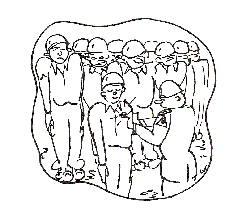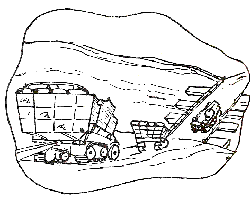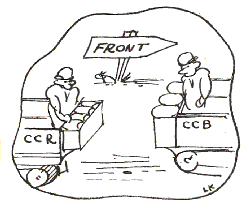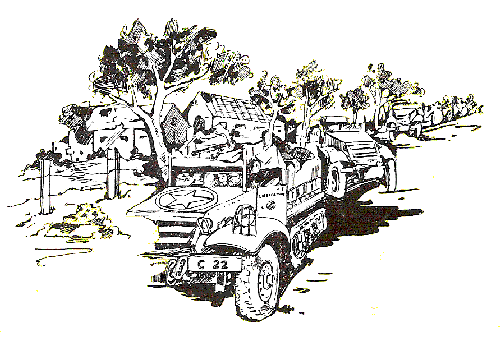| History - 49th A.I.B. - Company 'C' |
 | Index
|
| Index
| | Next |
| Next |
|
(Pages 18-21)
|
A N O T H E R S T A R T
|

March 26 was a momentous day. Freshly scrubbed and dressed in our best O. D. clothes, we paraded to the outskirts of Venlo in battalion formation to at last be awarded the combat infantry badge. Some of us had even gone so far as to remove wallets, papers and what not from our shirt pockets in order that the
badge might show to better advantage. It was a particularly sunny day and as the files marched along it was truly a stirring sight.
That evening, as most of us were preparing to venture out with our newly acquired prize, orders came alerting us to prepare to move to Walbeck, Germany. Although rumors were thick and heavy prior to this time, hardly anyone with the exception of our staff knew the exact time of our departure. Chaos followed;
bedrolls, barracks bags and what not were loaded. During this time everyone was wandering around checking and rechecking for any equipment or previous "loot" left behind. Some of us even tried to bribe the cooks for extra rations on the trip ahead. Walbeck, sounded to many of us as a place halfway to Berlin.
Our Dutch friends, especially the fairer sex, had come out in full force to witness our departure. Having firmly established ourselves in Venlo in the short space of two weeks, many of the local "gals" were rather misty eyed at the thought of our departure.
Biagini and Dick, commuting back and forth from their tracks heckled each other
|
and refused the pleas of their squads to dismount, while they were taking in the last goodbyes of the local 'belles'. The mortar and first rifle squads of the second platoon were as usual trying to attract the most attention. It wasn't until later that we discovered we were minus two
members of our company. T/5's Comstock and Waugh returning from a nocturnal adventure, barely managed to tag on with the tail end of Service Company.
As we moved along to the outskirts of the town our column was stopped, apparently for no reason at all. It wasn't long before we found out why. Forward elements of the column had been strafed by enemy
planes and many of us could see the pattern our tracers made as they beat off the attack. After spending
several hours along the road, the column moved forward once more.
The next morning, March 27th, we accomplished what many of us had looked forward to doing. The
crossing of the formidable Rhine. This was done on a pontoon bridge in the vicinity of Wesel. As our vehicles passed over, many caustic remarks could be heard about the muddy Rhine. Almost everyone remembered the days spent, practicing for a crossing in assault boats. Others, however, were called upon to make the initial crossing and now we were crossing the easy way and slicing into Germany. Later on in the day we had many frequent stops due to changes in orders. Having not had any sleep or rest at all the night before, we were more than slightly peeved at these delays.
Finally, we reached Walbeck. The first thing done was to scatter the platoons over the village to afford us the best defensive positions. It was here that 'Tennessee' Kaylor and 'Alabam' Campbell 'appropriated' a fat chicken for the frying pan. The remainder of Kneller's squad was in the same room waiting for a share in the loot. Due to the radiating warmth of the stove, the squad one by one dropped off to sleep leaving the chicken to burn to a lovely black crisp. Such - - -was the saga of the pilfered hen.
|
-- 18 --
|
The next day, March 28th, we moved out to the woods near the vicinity of Heikenskath, arriving in the morning. Up to this time we had been attached to the 36th tank battalion. Our orders were changed,
reverting us back to the 49th, to continue the march with them. We were then ordered to move to the woods in the vicinity of Dorsten, arriving there the night of March 29th. Most of the night it had been raining and we were wet, cold and tired.
As our platoons moved along the approaches to Dorsten, 'Combat' Knapik endeavored to maintain a higher morale with the fellows but no one seemed to aid him. However, as the sun finally peeped through and no resistance had been encountered up to this point, the men began to cheer up a bit and tossed jokes back and forth. Later we were informed that we were in support of CCA, however, CCB was once again to push through and assume control of the situation very soon.
At 0800 we pushed off in a column of platoons for Dorsten. Advancing slowly up to the city, we could see various wrecked German equipment and realized that once again we were approaching contact with the enemy. We continued on until momentarily delayed by a blown up bridge just before the entrance to the outskirts of the city. It was here that General Colsen, commander of CCA, informed us that intermittent 88 fire was
coming from the right flank. At this point having detoured around the bridge, the company deployed into a wedge formation. The first platoon was on the right, the third platoon on the left and the second platoon in support. The first and third platoons screened the high ground on either side of the road for any possible sites or information on the enemy artillery. Nothing was seen or found and the enemy continued to shell us sporadically. Orders were then received from the "old man" to move into Dorsten and relieve units of the 75th Infantry Division. Their assigned task was to hold positions along a steep railroad embankment running parallel with the city.
While moving up to accomplish this, we could see the 'plastering' our air force had done to the buildings. Few structures had been left untouched. Because of the rubble and condition of the streets, the company moved into a column to find a passage. Lt. Kimpel, Lt. Lybrand and Lt. Wingender stopped at a road
junction to confer, and were approached by Captain Clark who was moving up the column. Just then, an enemy mortar round dropped among them and the 49th battalion staff members. Lt. Kimpel was seriously wounded, Lt. Lybrand was killed
|

and Lt. Wingender was slightly wounded in the hand. The radio operator Pvt. Elbert Hart was killed outright, Sgt. Stanley was seriously wounded, and Pfc. Whithers was slightly wounded, his second time. Three engineers passing by at this time in a peep were also wounded ---all by that one round. The old story of the enemy zeroing in on road junctions. Looking around, one could see the expression on the men's faces, each wondering who would be next.
However, Dorsten did have its lighter moments. While in the process of clearing out the buildings. some of the boys chanced upon a cache of soda-pop. Edmunds and Williams returned later and lugged the
cases to the platoon areas where they were heartily enjoyed.
Here, the official "Looters Club" was formed. The boys did themselves proud in the amount and value of goods appropriated. Cameras, guns and typewriters were predominant. Schneider acquired an accordion
and from then on our peace and quiet ceased.
Later, one squad from each platoon was assigned a certain sector on the railroad embankment and established their position. All through the night we were receiving enemy artillery fire; some of it was
coming too close for comfort. Oakey can testify to this. While returning to the cellar to awaken his guard relief, three artillery shells followed him almost all the way to the cellar door. Oakey's feet took on wings and he literally flew inside.
One of the first platoon's squad was later withdrawn from the embankment and with the rest of the platoon. was sent to the 53rd Engineers as security, while they constructed a bridge over the Lippe Canal. The next morning, March 30th, the platoon set up their 50 caliber machine guns for air security of the bridge.
Later that day they were relieved and received enemy 88 and automatic weapons fire while effecting the change. No casualties resulted. In the evening, enemy planes overhead were fired upon by our halftracks.
|
-- 19 --
|
That night our orders reverted us back to the 36th tank battalion. Mounting our tracks we moved out for Kirchhellen. About two hours later, we arrived. Stumbling out with our bed rolls we thought we
were due for a good night's rest. Such was not the case.
Early the next morning, March 31st, we were ordered to move out and pass CCR, continuing the
attack to cut the road between Hamm and Soest.
We assembled and started our march. Meeting no enemy resistance, we arrived at Burckhausen in the evening. Captain Clark reported to the 36th tank battalion C. P. for further orders. He was told to move out as quickly as possible. Pausing briefly, we gulped down a hasty meal and mounted our tracks again. What a night that was. It was extremely dark and everyone stumbled around trying to find his own vehicle. No one had any rest or sleep and our patience was ebbing away rapidly. The 49th battalion moved through the area while the 36th was attempting to turn two elements around to start the movement. It was quit a feat to accomplish in the dark and we found ourselves in a traffic jam. What a setup! Tanks, halftracks, trucks and peeps all trying to jockey into
position. It reminded us of a night in 'blackout' London. Finally, we found ourselves traveling back to Dorsten and some of the optimists were saying we were to be relieved. Quite a joke, and it turned out to be different.
On the next morning, April 1st, we re-entered Dorsten, and rolling through the city, we crossed the Lippe Canal and continued our march. We picked up speed and continued to press the retreating Germans. Up and down hills, through patches of woods and over flat ground we advanced. Finally, tired and hungry, we arrived at Selm. We dispersed our vehicles in open fields and billeted in the surrounding houses for
rest and food. Most of the day was spent in writing letters and hobnobbing with each other. Being Sunday and Easter Sunday at that, we had a short church service which

|
was well attended. Not the best of places to be on this particular day but many of us were hoping the next one would be spent at home. Later that night, orders sent us on the march again.
Moving along the countryside, our long caravan of vehicles showed our strength. It was amazing how our long fingers of armor were knifing into the heart of Germany. Rolling along that night, one had the
feeling that not a thing could stop us.
On the morning of April 2nd, task force Roseborough leading CCB met resistance. However, the resistance being negligible, it was decided to bypass and continue. All that day we marched along until 1430 when our column met heavy resistance at Neuhaus. A and B companies of our task force moved up to the attack
aiding units of the 88th Recon. A company moved into the west edge of the town with B company helping the frontal attack. Because of approaching darkness, it was decided to withhold any further advances until dawn. At this time, C company was recalled to the 49th as a reserve unit and ordered to dig in around the battalion C. P.
The first and second platoons moved into position, with the third platoon as support. The digging was extremely difficult due to a constant rain which resulted in mud filled foxholes. Although there were orders for silence, one could faintly hear the murmuring and cursing as the boys feverishly dug in. It was a very trying night on the nerves. At intervals we could hear and see the tracers of "burp guns" stabbing the
darkness to our front. A building to our right was still burning and everyone crouched deeper to keep from being silhouetted in the light.
During the night A company was counterattacked. The "krauts" were aggressive and even moved into the same buildings where they were holding out. Finally, they called for our artillery to lay down a barrage around their positions. Retiring to the cellars for safety, the firing started and rained heavily on the 'jerries' throughout the remainder of the night. Our artillery did a beautiful job. This was too much for the
Germans and they withdrew, moving back to the other side of the town.
The following morning, April 3rd, C company moving around to the right flank, was ordered to attack through A company's lines. Stiff and sore from an all night vigil, we prepared for the attack. It rained continuously, adding to our misery.
|
-- 20 --
|
A platoon of tanks (B. Co. 36th) was attached to our company in support. We jumped off at 0900 in approach march formation. The third platoon, first platoon, second platoon and the anti-tank platoon as
weapons platoon. Reaching the first few houses we received small arms fire and had one casualty, Pfc. Williams. Having cleared these houses we waited for guides from A company to clarify their positions and the present situation. After a wait of some time, a guide finally joined the "old man" and Colonel Roseborough. Our next step was to move around to the extreme right flank of A company's positions. The tanks moved well to the right of the road towards the objective. On nearing A company's position, C Company was pinned down by sniper fire. Captain Clark and Colonel Roseborough being at the head of the column received direct fire from an enemy tank.
Meanwhile, our tanks moved forward until they were in position around the buildings, while the rest of the
company infiltrated under sniper fire to the cover ofhouses. There we waited for B company to take a road
|
junction on our left and clear out the snipers. Discovering 20mm gun positions to our front, we called for supporting artillery. When it failed to knock out the enemy emplacements, Watz worked the positions over with the 60mm mortars.
Wanting to continue the attack, a rifle squad under Biagini and Miller rushed the houses at the road junction in B company's zone of action. The squad received heavy machine gun fire from fixed enemy
positions and direct fire from an enemy tank, which resulted in five casualties: Biagini, Kondos, Edmunds,
Verhoff and Strader. The squad fired on the tank with rifle grenades but was forced to withdraw. The afternoon wore on with occasional small-arms fire being exchanged by both sides. In the early evening, elements of the 83rd Infantry Division moved up to relieve us and we pulled back to our assembled vehicles for food and rest. Within the next two hours orders came alerting us to move out again. Wet, and miserably cold, we wondered where we were to go.
|

|
-- 21 --
|